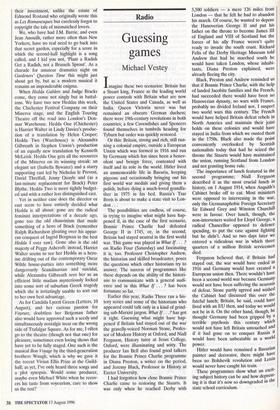Radio
Guessing games
Michael Vestey
Imagine these two scenarios: Britain has a Stuart king, France as the leading world power controls with Britain what are now the United States and Canada, as well as India. Queen Victoria never was but remained an obscure German duchess; there were 19th-century revolutions in both countries; a few Cavendishes and Spencers found themselves in tumbrils heading for Tyburn but order was quickly restored.
Or this: Britain, strong and rich, still run- ning a colonial empire, outside a European Union which was formed in 1916 and run by Germany which has since been a benev- olent and benign force, contented with itself and its role in the world. Hitler lived an unmemorable life in Bavaria, keeping pigeons and occasionally bringing out his first world war medals and giving them a polish, before dying a much-loved grandfa- ther in 1975 in his bed. Russia's Tsar Boris is about to make a state visit to Lon- don ...
The possibilities are endless, of course, in trying to imagine what might have hap- pened if, in the case of the first scenario, Bonnie Prince Charlie had defeated George II in 1745, or, in the second, Britain had stayed neutral in the first world war. This game was played in What If . . . ? on Radio Four (Saturday) and fascinating it is, too. Professor Christopher Andrew, the historian and skilled broadcaster, poses the questions which other historians try to answer. The success of programmes like these depends on the ability of the histori- ans to communicate with a general audi- ence and in this What If . . . ? has been fortunate so far.
Earlier this year, Radio Three ran a his- tory series and some of the historians who appeared could talk only in a kind of grind- ing sub-Marxist jargon. What If . . .? has got it right. Guessing what might have hap- pened if Britain had stayed out of the war the gravelly-voiced Norman Stone, Profes- sor of Modern History at Oxford, and Niall Ferguson, History tutor at Jesus College, Oxford, were illuminating and witty. The producer Ian Bell also found good talkers for the Bonnie Prince Charlie programme in Diana Preston, a writer on the period, and Jeremy Black, Professor in History at Exeter University.
I had forgotten how close Bonnie Prince Charlie came to restoring the Stuarts. It was only when he reached Derby with 5,500 soldiers — a mere 126 miles from London — that he felt he had to abandon his march. Of course, he wanted to depose the Hanoverian George II and put his father on the throne to become James III of England and VIII of Scotland but the forces of his ally France weren't quite ready to invade the south coast. Richard Felix of the Derby Heritage Museum told Andrew that had he marched south he would have taken London, whose inhabi- tants, Diana Preston explained, were already fleeing the city.
Black, Preston and Andrew reminded us that if Bonnie Prince Charlie, with the help of landed Jacobite families and the French, had succeeded there would have been no Hanoverian dynasty, no wars with France, probably no divided Ireland nor, I suspect two world wars this century. The French would have helped Britain defeat rebels in North America and maintain their joint holds on these colonies and would have stayed in India from which we ousted then.' in the 1750s. Black also made the point conveniently overlooked by Scottish nationalists today that had he seized the throne the Stuarts would have maintained the union, running Scotland from London and not granting home rule.
The importance of lunch featured in the second programme; Niall Ferguson described it as the most crucial lunch in history, on 1 August 1914, when Asquith's Cabinet broke off to eat. Most ministers were opposed to intervening in the war, only the Germanaphobic Foreign Secretary Sir Edward Grey and Winston Churchill were in favour. Over lunch, though, the non-interveners waited for Lloyd George, radical Chancellor opposed to defence spending, to put the case against fighting but he didn't. And so two days later we entered a ridiculous war in which three quarters of a million British servicemen died.
Ferguson believed that, if Britain had stayed out, the war would have ended in 1916 and Germany would have created a European union then. There wouldn't have been a second world war because Germany would not have been suffering the neurosis of defeat. Stone partly agreed and wished the Cabinet had discussed this over the fateful lunch; Britain, he said, could have lived with an EU then, and today we would not be in it. On the other hand, though, he thought Germany had been gripped by a terrible psychosis this century which would not have left Britain untouched and if it had gone on to conquer Russia it would have been unbeatable as a world power. Hitler would have remained a Bavarian painter and decorator, there might have been no Bolshevik revolution and Lenin would never have caught his train.
These programmes show what an excit- ing subject history can be and how depress- ing it is that it's now so downgraded in the state school curriculum.


















































 Previous page
Previous page